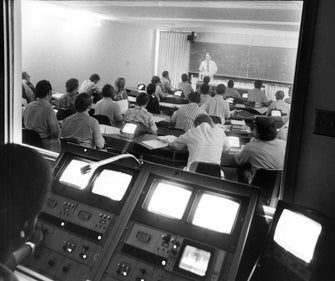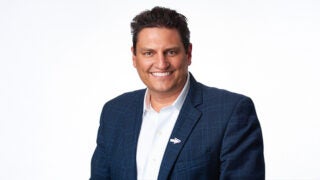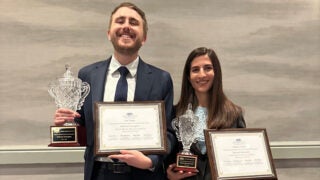
USC embraces online graduate education
Nationwide, millions of students are trekking back to college classrooms this fall, but more students than ever are going back to school online. According to a report from The Sloan Consortium, the rate of growth in online enrollments is 10 times the rate of growth in all higher education.
At USC, roughly 4,800 graduate students are enrolled in accredited online master’s degree programs that span nine USC schools. Altogether, USC’s online education programs reach 5,500 remote students through graduate-level degree programs and executive and continuing education programs.
“USC faculty have embraced the potential of online graduate education and have eagerly explored and experimented with models that can engage learners and spark powerful ideas, fresh insights and new knowledge,” USC President C. L. Max Nikias wrote in a recent letter to the USC community. “As we continue to implement this online education model, we expect to double our enrollment and degree offerings within the next five years.
“Total annual revenues for online USC professional, graduate and continuing education programs are expected to reach $114.5 million this year — a figure that may be unprecedented for a top American research university,” he continued.
USC has been a pioneer in distance learning, beginning 40 years ago when the USC Viterbi School of Engineering used microwave technology to beam courses to engineers across Southern California. Last June, USC brought together years of innovation in graduate professional online education under one brand name: USCNow.
The university’s online education strategy adheres to the following priorities and principles:
1. USC’s focus is on master’s and graduate degree programs, along with executive and continuing education. It is at these levels that top research universities have a meaningful role to play in the online education revolution.
2. Online programs must preserve academic rigor, integrity and excellence above all other considerations. Technology must be used to facilitate and enhance, but never dilute, the intellectual encounter between and among faculty and students. The online curriculum must be as rigorous as the conventional curriculum.
3. Online degree programs will use USC’s normal admissions standards and charge regular tuition rates. Other universities are increasingly offering online courses for free, with scant concern for whether enrollees ever complete a course. Our goal, by contrast, is to ensure that the educational experience is reserved for only those students with the requisite interest and ability to meet our faculty’s high expectations.
4. While partnering with outside education entities, our faculty and schools will retain sole responsibility for ensuring academic quality. School and university curriculum faculty committees will directly assess the rigor of such programs, as they do with traditional on-campus graduate programs.
5. USC will not offer online degrees at the undergraduate level. This university does not intend to join the growing ranks of institutions that seek to franchise undergraduate education through the Internet or through smaller satellite campuses abroad.
The online offerings at USC include programs in the following schools:
Keck School of Medicine of USC
In collaboration with the schools of dentistry and pharmacy, the Keck School offers an online Master of Academic Medicine program, which combines online coursework with annual on-campus face-to-face sessions for one week each March. In addition, students can earn online Master of Public Health degrees, a program designed for individuals interested in public health practice and policy.
USC Annenberg School for Communication and Journalism
USC Annenberg welcomed its first cohort of students in the Master of Communication Management program last fall. In addition to having access to video and audio modules, students engage in interactive multimedia dialogues, including video-style conferencing with professors and fellow students.
USC Davis School of Gerontology
The first school to offer a gerontology degree over the Internet, USC Davis currently offers five interactive, Web-based programs designed for professionals involved in the care of the elderly, including a Master of Arts, Master of Science and graduate-level certificate in gerontology, Master of Aging Services Management and Master of Long Term Care Administration.
USC Dornsife College of Letters, Arts and Sciences
The school offers both a master’s degree program and a certificate program in Geographic Information Science and Technology.
USC Price School of Public Policy
Launched last fall, the school’s online Master of Public Administration degree program, which can be completed in 24 months, uses video conferencing and Web-based discussions to provide a high level of interactivity between online students and faculty. It also offers an Executive Master of Health Administration online program for mid-career clinical and management professionals.
USC Rossier School of Education
The school’s Master of Arts in Teaching — MAT@USC — program, which received the 2011 International Award for Innovative Practices in Higher Education in Washington, D.C., successfully places some 90 percent of its graduates in employment positions or advanced study.
USC School of Pharmacy
Students can complete a certificate program or earn a Master of Science degree in regulatory science online.
USC School of Social Work
Available nationally through the school’s Virtual Academic Center, the online Master of Social Work — MSW@USC — program includes 20 hours per week of supervised field instruction in the communities where students live and work. It currently boasts an enrollment of more than 1,000 students.

USC Viterbi School of Engineering
The school was the forerunner of USC’s distance education programs that began in 1972. From its transition from microwave to satellite to online technology, the school now offers more than 40 master’s degree and graduate certificate programs through its Distance Education Network.
“In the next few years, we expect all 18 USC schools to offer robust online programs in master’s, executive and continuing education,” Nikias wrote. “We will support our faculty and students as they continue to experiment with new digital technologies and new educational paradigms — within classrooms, libraries, laboratories and online — to kindle and maintain a lifelong fire of learning within all of our current and future students.”



